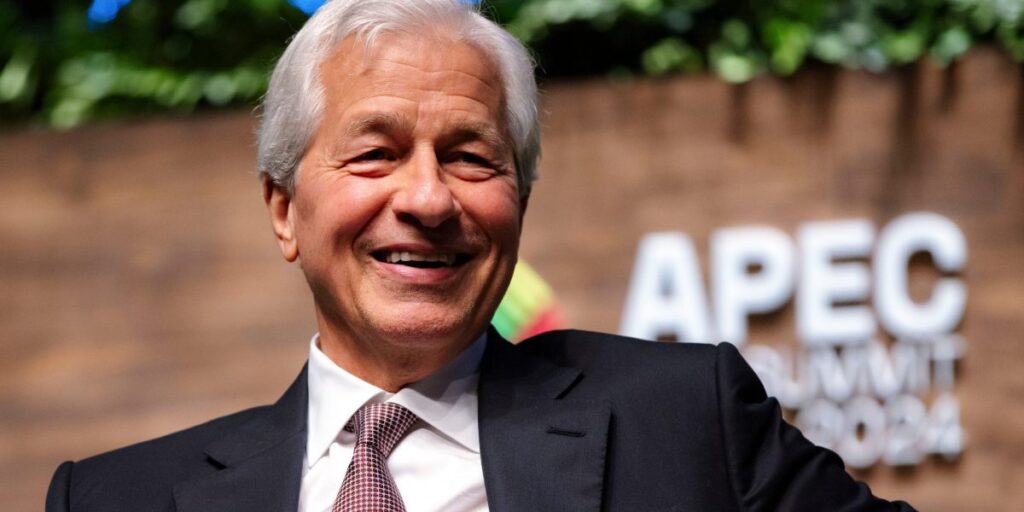JPMorgan CEO Jamie Dimon is shaking off doomsday predictions about what AI means for humanity—instead laying out how he sees the technology vastly improving businesses and the work-life balance of their employees.
Even Dimon—a fierce advocate of long-established career norms such as working hard, being prepared for anything and working in the office—says future generations of employees could work a day and a half less every week, thanks to AI.
As well as the working week shrinking from five to three and a half days a week, Dimon also predicts that staff in the future could live to 100 years of age.
Thousands of people at America’s biggest bank are already using the technology, Dimon told Bloomberg TV, adding that artificial intelligence is a “living breathing thing” that will shift over the course of history.
The technology may be utilized by JPMorgan for a vast range of areas—errors, trading, research, and hedging to name a few—arguably illustrating fears that AI will take the jobs of human counterparts.
Goldman Sachs predicts that approximately 300 million jobs will be lost to the technology, with around a quarter of the American workforce fearing in the future they will lose their roles to artificial intelligence.
But the advance of technology is also something societies have grappled with before, Dimon pointed out, adding that with AI and large language models there are also huge opportunities to improve living standards.
“People have to take a deep breath,” Dimon said. “Technology has always replaced jobs. Your children are going to live to 100 and not have cancer because of technology, and literally they’ll probably be working three and a half days a week.”
Employees could scale back on their working hours, thanks to the technology being used to automate some of their activities, McKinsey found in a report published last year.
The report also found that generative AI and other emerging technologies have the potential to automate the tasks which take up 60% to 70% of employees’ time at the moment—adding between $2.6 trillion to $4.4 trillion to the global economy every year.
And while businesses are still grappling with how quickly AI will transform their sector, arguments are already being made to reduce the number of days in the current working week.
A British study of 61 organizations, carried out by the University of Cambridge, saw a 65% reduction in sick days during a four-day working week, while 71% of employees said they had reduced levels of burnout. As a result, 92% of the companies on the program said they’d be keeping a three-day weekend.
Dimon and McKinsey are not the first economics leaders to predict that technology will lead to a shorter workweek, however. In a 1930 essay titled “Economic Possibilities for our Grandchildren,” the economist John Maynard Keynes predicted that his grandchildren’s generation would be working 15-hour weeks because of increased productivity. The current average in Keynes’s U.K. is 36.4 hours.
‘There are negatives’
Like many other thought leaders, Dimon is aware that the technology could prove to be a powerful weapon if it fell into the wrong hands.
Echoing the concerns of individuals such as Apple cofounder Steve Wozniak and Microsoft cofounder Bill Gates, Dimon said: “Technology has done unbelievable things for mankind but, you know, planes crash, pharmaceuticals get misused—there are negatives.
“This one, the biggest negative in my view, is AI being used by bad people to do bad things. Think of cyber warfare.”
Like Sam Altman, the CEO of ChatGPT maker OpenAI, Dimon also says he hopes to see guardrails introduced to the sector, though acknowledged this may take some time to come to fruition because the technology is relatively new.
The billionaire boss of the New York–based bank also noted some employees’ lives will be disrupted by the technology displacing their roles. In JPMorgan Chase’s case at least, Dimon said he hopes to “redeploy” any staff who are pushed out of a job by AI.
He drew comparisons with JPMorgan’s acquisition of First Republic in May 2023, when the latter bank fell victim to a wave of banking instability before agreeing to a $10 billion deal.
“At First Republic we’ve offered jobs to 90% of people. They accepted, but we also told them some of those jobs are transitory. But we hire 30,000 people a year, so we expect to be able to get them a job somewhere local in a different branch or a different function if we can do that,” Dimon explained. “We’ll be doing that with any dislocation that takes place as a result of AI.”
A version of this story originally published on Fortune.com on October 3, 2023.
How many degrees of separation are you from the globe’s most powerful business leaders? Explore who made our brand-new list of the 100 Most Powerful People in Business. Plus, learn about the metrics we used to make it.
